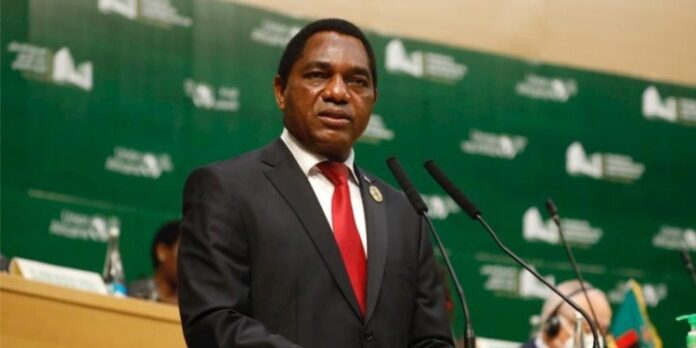The recent arrest of two men in Zambia for allegedly attempting to bewitch President Hakainde Hichilema has sparked outrage.
The two individuals were charged under Zambia’s Witchcraft Act, which criminalises the possession of charms, professing knowledge of witchcraft, and cruelty to wild animals.
According to reports, the police discovered various charms, including a live chameleon, in their possession.
The chameleon is believed to have been part of their alleged plan to harm the president.
The Advocacy for Alleged Witches (AfaW), a prominent human rights group, has condemned the arrest.
Leo Igwe, a Nigerian and the founder of AfaW, expressed his concern in a statement released on Sunday.
Igwe described the arrest as a sign of the Zambian government losing focus on critical issues facing the country.
He called for a shift away from criminalising unfounded suspicions and towards addressing the real socio-economic challenges Zambia is grappling with.
“We should not be focusing on witchcraft accusations while the country faces numerous challenges,” Igwe stated.
He emphasised that there is no scientific evidence to support beliefs in witchcraft or the effectiveness of charms in modern politics.
“The Advocacy for Alleged Witches is concerned over the reported arrest of two men accused of being ‘witchdoctors’ in Zambia,” Igwe said.
He went on to explain that the charges against the men related to the Witchcraft Act, which bans the possession of charms and the professing of witchcraft knowledge.
Igwe argued that accusations of witchcraft have no place in modern political discourse.
“These individuals were accused of trying to bewitch President Hakainde Hichilema. The police claimed they had charms to harm the president,” Igwe noted.
He pointed out that accusations of witchcraft have long been used to justify political action and social control.
Igwe criticised the government for focusing on witchcraft accusations instead of addressing Zambia’s economic issues.
“The government should focus on fixing the country’s economic problems, not on pursuing superstition,” Igwe added.
He also raised legal concerns about the use of Zambia’s Witchcraft Act in this case.
Igwe explained that the law prohibits the criminalisation of individuals based solely on accusations of witchcraft.
Zambian law does not allow anyone to be accused of being a witch without clear proof of their involvement in harmful acts.
“The authorities should not be using the Witchcraft Act as a weapon to justify this arrest,” he stressed.
According to Igwe, the law requires proof of witchcraft before individuals can be legally charged, and the police have failed to demonstrate such evidence in this case.
He questioned the police’s claims that they knew the two men were “witchdoctors,” especially without any official identification as such.
“Did these men identify as witchdoctors? If not, the police have overstepped by naming and imputing witchcraft,” Igwe argued.
The human rights activist also raised doubts about the police’s claims that the men were attempting to harm the president with the charms they possessed.
He questioned the logic behind the idea that a chameleon could be used to inflict harm.
“How did the police know they wanted to harm the president? What makes a chameleon a charm?” Igwe asked.
He called the police’s actions a violation of the Witchcraft Act, which forbids anyone from professing knowledge of witchcraft.
Igwe demanded an explanation from the police, asking how they could prove that the charms had any harmful purpose.
The arrest has ignited criticism from across Zambia, with many questioning the government’s focus on witchcraft instead of addressing pressing socio-economic issues.
Zambia, like many other African countries, has long struggled with accusations of witchcraft, especially among political leaders and high-ranking officials.
These accusations are often tied to political rivalries and attempts to undermine opponents.
In this case, the charges against the two men highlight the deep-rooted superstition in Zambia, which still plays a significant role in the country’s political and social landscape.
Igwe pointed out that while witchcraft accusations may have been common in the past, they have no place in modern society.
“The modern world should leave these beliefs behind,” he said.
He stressed the importance of focusing on real challenges, such as economic hardship, unemployment, and poverty, instead of wasting resources on witchcraft investigations.
Zambia’s Witchcraft Act, passed in 1971, has been controversial since its inception.
While the law was intended to protect individuals from being accused of witchcraft, it has often been used to control and silence opposition.
Critics of the Act argue that it has been misused by politicians to target rivals and maintain power.
Human rights groups, including AfaW, have long campaigned against the use of witchcraft laws to suppress freedom of speech and political dissent.
Igwe concluded by calling for an end to what he described as a “state-sponsored witch-hunt.”

